|
|
|
Sort Order |
|
|
|
Items / Page
|
|
|
|
|
|
|
| Srl | Item |
| 1 |
ID:
119465
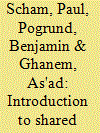

|
|
|
|
|
| Publication |
2013.
|
| Summary/Abstract |
S ince the publication of S hared H istories 1 in 2005, the narratives of the various sides in the Israeli-Palestinian conflict have become both a cottage industry 2 and a common catchphrase 3 used frequently even by negotiators and politicians. However, the concept of narratives as a working tool in the peace process has not yet been taken on board by those involved in resolving the conflict.
|
|
|
|
|
|
|
|
|
|
|
|
|
|
|
|
| 2 |
ID:
119472
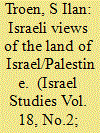

|
|
|
|
|
| Publication |
2013.
|
| Summary/Abstract |
T he J ewish claim to the L and of I srael (E retz I srael) is a very large topic with a historical pedigree thousands of years old. These claims were long rooted in a Jewish peoplehood as defined in a religious culture until the growing secularization of Jews during the 19th century shifted claims from an exclusively religious basis to one that incorporated increasing reliance on secular concepts, particularly nationalism with its demand for a polity. This was just as well since in the contemporary world, religiously-based claims are viewed as parochial. Secular claims are more generally considered universal and therefore appropriate for public debate. In other words, claims rooted in a religious tradition may be effective when directed to fellow-believers; claims expressed in secular terms are more acceptable in extra-communal discourse. Thus, claims to Eretz Israel or Palestine that rely solely on the Covenant between God and the Jews or on the status of Palestine as a Waqf may persuade Jews and Muslims respectively, but have lesser effect when brought to courts of public opinion and the academy.
|
|
|
|
|
|
|
|
|
|
|
|
|
|
|
|
| 3 |
ID:
119469


|
|
|
|
|
| Publication |
2013.
|
| Summary/Abstract |
T his article aims at confronting the I sraeli and P alestinian constitutive clash of national historical narratives and their significance in shaping identities of â??selfâ? and â??otherâ? in the conflict and in constructing obstacles to conflict resolution. It looks into the historic junctions of decision making and appraises processes that left their imprint on collective memory and perceptions. Some of the major themes and histories are analyzed and explained within their own historical context in order to deconstruct demonized images. It addresses the questions: What is â??narrativeâ??? Why does the Palestinian narrative conflict and contrast sharply with the Israeli narrative? Why do Israelis and Palestinians object to the national interpretation of the other? Is there a solution to their conflicting claims and is this solution attainable peacefully, and without force and violence? How can we overcome the narrative barrier to conflict resolution and move from a past and present conflictual relationship to a future cooperative relationship?
|
|
|
|
|
|
|
|
|
|
|
|
|
|
|
|
| 4 |
ID:
119473


|
|
|
|
|
| Publication |
2013.
|
| Summary/Abstract |
W hile theorists of nationalism have described the masses as followers of elites who imagine or invent identities for them, it can be argued that the creators of nations have had to act within the framework of the popular culture and consciousness. They must be acquainted from the outset with religious, linguistic and cultural traditions and have to contend with them before they can begin to shape them according to their aims.
|
|
|
|
|
|
|
|
|
|
|
|
|
|
|
|
| 5 |
ID:
119471


|
|
|
|
|
| Publication |
2013.
|
| Summary/Abstract |
A number of books were published in A rabic about the meaning of the Arab colossal defeat ( Nakba) in 1948 and its implications during the first decade following this eventful catastrophe. In the summer of 1948, Constantine Zurayk was the first to try and analyze the reasons behind the Nakba, followed by Musa al-â??Alami during the following year. 1 However, in the years that ensued, very little was published about the meanings of the Nakba and its repercussions, either by Palestinians or by other Arab intellectuals. Then, â??Aref al-â??Aref published his six-volume seminal work entitled Al-Nakba, Nakba of Bayt al-Maqdis or Paradise Lost. 2 These books and other Arab publications during the first decade after the catastrophe were important contributions to the Arab understanding of this traumatic event and of the necessary conditions to overcome its results. However, the stream of intellectual works on this topic seemed to dry up from the late 1950â??s writers turning instead to other issues such as the political changes then taking place in the Arab regimes and other current events.
|
|
|
|
|
|
|
|
|
|
|
|
|
|
|
|
| 6 |
ID:
119466
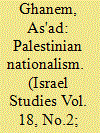

|
|
|
|
|
| Publication |
2013.
|
| Summary/Abstract |
A ccording to the literature there are two types of nationalism: First, Civic (territorial) nationalism emphasizes the common territory and citizenship as the criteria for individualsâ?? inclusion in the national group. 1 Here the national group is the totality of citizens, with no emphasis on their primordial ethnic affiliation; the national culture consists chiefly of civic and universal values. This kind of nationalism is found in France, Great Britain, and the United States. Civic nationalism crystallizes under the shadow of attempts to establish hegemony for the dominant group culture, values and basic beliefs.
|
|
|
|
|
|
|
|
|
|
|
|
|
|
|
|
| 7 |
ID:
119475
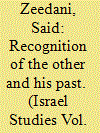

|
|
|
|
|
| Publication |
2013.
|
| Summary/Abstract |
I t is unfortunate that both P alestinian A rabs and I sraeli J ews are still stuck in the past, trapped in it, unable to be free from its yoke, unable to overcome or transcend or supersede it. Both utilize and mobilize the past, or their respective construal of it, in order to rationalize, justify and support their competing claims, rights, complaints, narratives, policies and actions in response to current events.
The past is never allowed to lay in rest. Since the turn of the 20th century, more obviously since the traumatic events in 1948, this tormenting past has never ceased to hover over the horizons of Palestine/Israel. It is a merciless and ruthless past indeed. The more one broods upon this past, thus used and abused, the less one is inclined to recognize the other, his rights and his past, especially in times of bloodshed and in times of intense suffering.
|
|
|
|
|
|
|
|
|
|
|
|
|
|
|
|
| 8 |
ID:
119468
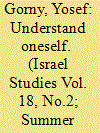

|
|
|
|
|
| Publication |
2013.
|
| Summary/Abstract |
T his article reflects upon the J ewish-A rab conflict from an individual cognitive angle of two leading political figures in the Zionist movementâ??Zeâ??ev Jabotinsky and David Ben-Gurion. I choose them because to intents and purposes they were the prominent leaders of two polar ideological movements: the Hebrew Labor movement, and the Revisionist Party in the Zionist movement in the years 1920â??1940. I do not intend to deal with their policies toward the conflict but rather to explain their political principles, by which they sought to solve it.
|
|
|
|
|
|
|
|
|
|
|
|
|
|
|
|
| 9 |
ID:
119470


|
|
|
|
|
| Publication |
2013.
|
| Summary/Abstract |
I n A ugust 2006, during the political tension at the time of the planned unilateral Israeli withdrawal from the Gaza Strip, a group of settlers in Gaza and the West Bank attached orange stars to their sleeves that were reminiscent of the â??Yellow Starâ? Jews were forced to wear in countries under Nazi domination. A stormy reaction erupted among Israelis from all walks of life, including politicians from both right and left. The wall-to-wall condemnation maintained this was an act demeaning to the memory of the Holocaust. By donning the orange star the, settlers presented themselves as victims and the government as perpetrators, using one of the symbols of Jewish subjugation to Nazi oppression. The heated debate convinced the settlers to retreat from this demonstrative act.
|
|
|
|
|
|
|
|
|
|
|
|
|
|
|
|
| 10 |
ID:
119474


|
|
|
|
|
| Publication |
2013.
|
| Summary/Abstract |
â??B oth P alestinian nationalism and Z ionism, as concepts, embody the same principle; namely both are nationalist movements based on the requirement of a homeland for their own people.â? 1 The critical problem, however, seems to be that both have been claiming the same piece of land for their homelands, and thus the source of trouble is more practical than ideological. Contrary to the assumption hidden in this articleâ??s given title, political ideologies do not recognize nor reconcile with each other, nor do they determine who recognizes whom and who reconcile with whom. It is only individuals, and sometimes also collectives, whoâ??metaphorically speakingâ??initiate or undergo such modifications of relationship. Individuals tend to justify changes in their personal relations by terms that are either emotional ( e.g., fallen in love with her, cannot stand him anymore) or based on moral-normative grounds ( e.g., he behaved decently, she promised, yet . . .). Collectives, on the other hand, often rely on political ideologies as their justificationâ??or excuseâ??for moving from one state of relations with another collective to a different state. Yet, as the dominant Political Realist school argues, particularly, although not only, on the collective/national level, inter-relations are first and foremost determined by needs and interests of the actors. Ideologies are just the legitimizing hooks to hang on, not the genuine source of or the motivation for such a change.
|
|
|
|
|
|
|
|
|
|
|
|
|
|
|
|
| 11 |
ID:
119467


|
|
|
|
|
| Publication |
2013.
|
| Summary/Abstract |
T he issue of legitimacy in the Z ionist-P alestinian dispute consists of three interwoven aspects: 1) self-legitimacy, which obviously has characterized both national movements; 2) the legitimate rights of the otherâ??which were mutually denied for long periods of time; and 3) international legitimacy, which was roughly divided for a long time between the Western-Christian world that backed the Zionist claim, and the Arab and Muslim countries that identified with the Palestinian cause.
While a full symmetry has been maintained between the two national movements regarding their own legitimate rights, changes have taken place regarding mutual recognition and the position of the international community.
|
|
|
|
|
|
|
|
|
|
|
|
|
|
|
|
|
|
|
|
|